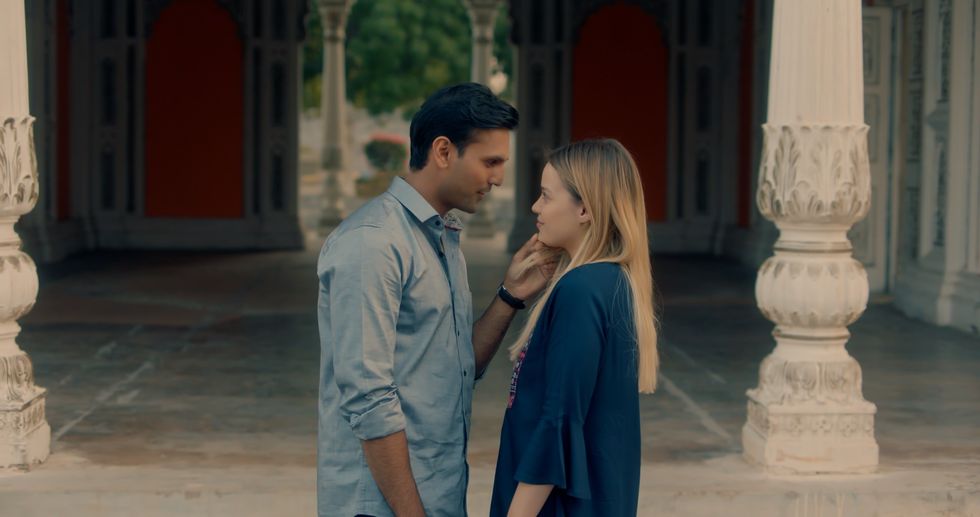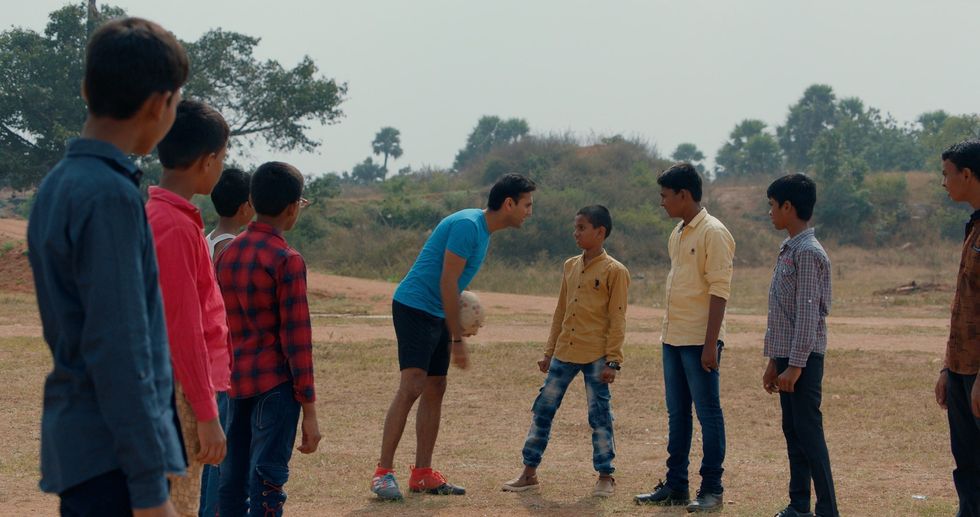KHAYAM KHAN’S coming-of-age film allowed him to reconnect with Hyderabad – a city in south India he hadn’t been back to for 25 years, the director told Eastern Eye.
A Game of Two Halves follows the journey of Sanjay (Saaj Raja), a young British student who finds himself in India teaching football to underprivileged children.
Khan shot the film in Hyderabad’s Ramoji Film City and said he was fascinated by how much the city – he was born in and spent his childhood – had changed.
“I grew up in Hyderabad for a while, I know the city quite well,” said Khan.
“I last went there probably 25 years ago and it has changed dramatically. It has gone rickshaws and bells on the streets to this modern city where they’ve got tube system running overground – it was eye opening.
“It was completely different to the Hyderabad I had seen.”

Khan said he spent most of his time in Ramoji Film City, but is keen to return and explore his “home” city. “It always will be home. I have my parents, cousins and friends in Hyderabad. The heart wants what the heart wants – I’ll always have a longing for India,” he said.
Khan’s outlook is different to that of the protagonist Sanjay in A Game of Two Halves. He describes him as an “alien landed in another planet” when he comes to India.
“I wanted to explore what it is that makes a culture a culture,” said Khan. “For example, you see a scene where Sanjay is eating roti with a knife and fork because he’s so westernised. You see Mia, his best friend, who is also from the UK, eating the same roti with her hands because she’s fitted in with the culture.
“What I wanted to try and show is that culture is something that comes from just doing the things we feel is right. And, yes, he is like an alien, a fish out of water in the environment, but through the journey he goes on, he finds his own position in life.”
Sanjay’s dream is to follow the love of his life to Harvard. However, a prank puts paid to those plans. Though initially miffed at the fact that he is in Hyderabad, and not Harvard, Sanjay goes on a journey of self-discovery. “Instead of chasing his girl in Washington, he ends up in India teaching kids how to play football,” said Khan.
“His journey teaches Sanjay and the audience to be comfortable in your own skin and not want to hang out with the cool kids or feel the need to belong. As a second generation Indian, I appreciate the wanting to belong – that resonated with me.
“Having grown up in an emerging multicultural Britain, where I was one of only a handful of brown-skinned kids at school, I identified with Sanjay and sympathise with his struggle to find acceptance.”
“In the film, I wanted to show the juxtaposition of what we believe our identity is and what it truly is when we find ourselves and are comfortable in the skin we’ve been blessed with.”

Khan said while the film isn’t set out to be overtly political, it features themes of identity and belonging.
“The film is a very much uplifting coming of age story, but Sanjay does have to deal with his identity. There’s a scene where he says, ‘I’m not going to apologise for liking fish and chips. I’m not going to apologise for not speaking Urdu, I’m not going to apologise for my privilege’.
“He does have to try and tackle that sense of what is it to be British and Asian? We try and do it in a somewhat light-hearted way so it doesn’t get too heavy or too political.”
With an influx of US TV shows and films in the UK, Khan said British Asians are gravitated away from south Asian culture.
As younger generations in this country lose interest in Bollywood films, Khan feels it’s important to have more films about south Asian culture that are produced in the UK.
“One of the things I’m trying to do with my production company K Squared Films is to tell those stories that aren’t often heard,so we can keep that link with south Asian,” he said. “The missing link is we’re probably not going back home as often because our grandparents are here now (UK), our parents and cousins are here – which is a change from previous generations.
“It’s down to us to tell the stories of what Bangladesh, India, Pakistan are like and hopefully that will make people feel like they are a part of that culture.”
A Game of Two Halves has an international cast with British and Indian actors including Harish Khanna (12th Fail), Lucy Jackson (The Ride), Sachin Chaudhary (Sacred Games). Nikkita Chadha (Barbie), Sudha Bhuchar (Mary Poppins Returns), Chizzy Akudolu (Holby City), David Aspden, (Bus Ride) Jacob Avery (Becoming Elizabeth) Pawan Chopra (Asur) Swaroopa Ghosh (War), and Rajiv Kumar Aneja (Tiger Nageswara Rao).
Khan revealed that Raja, in his first film as a lead star, went on a similar journey to Sanjay while making the film.
“We’ve got such a multicultural cast – some great Mumbai-based theatre actors in Harish Khanna, Pawan Chopra and Swaroopa Ghosh. And then Chizzy Akudolu, Lucy Jackson and David Aspden who bring the Western ethos and culture,” said Khan.
“The film almost reflects this story, which is a meeting of these two cultures. Sanjay actually lived that journey in reality, because he was working with these fabulous Indian actors who taught him so much about culture and Indian style of acting.
“And then these British actors who taught him about British acting; it was a good mix.”
For Khan, the football element was a big attraction to the script. As a diehard Liverpool fan, he has seen the unifying role the game plays and wants to see more Asians get involved in the sport.
“One of things I wanted to explore is that football is for all of us. But you don’t have many Asian players, you don’t have many black managers, and you certainly don’t have any Asian managers,” he said.
“If we showed some cultural films, it gives our kids something to aspire to.
“Take something like [popular TV show] We Are Lady Parts, which is about Muslim women breaking into the music industry. It shows young girls this is possible.”
n A Game of Two Halves premiered in UK cinemas last Friday (7)




